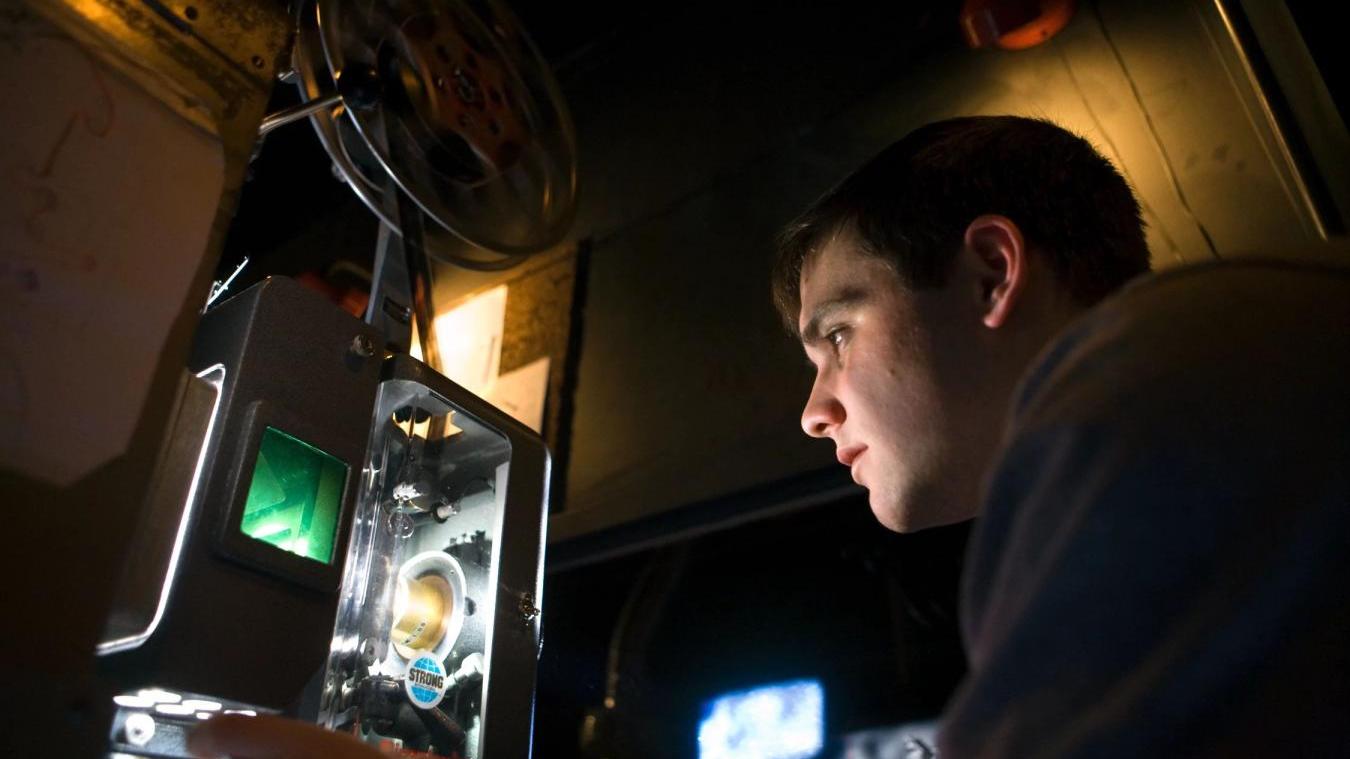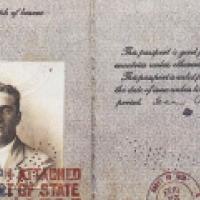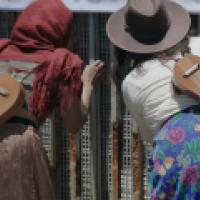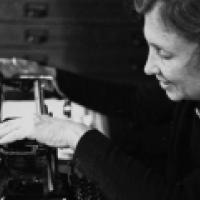Film series: Filmmaker Q & As


image from the film Fandango at the Wall
Cornell Cinema regularly plays host to visiting filmmakers, and this semester is no different; their visits will just be virtual.
First up is documentarian John Gianvito who will join us for a Q&A in conjunction with a screening of his latest film, Her Socialist Smile, winner of the Los Angeles Film Critics Association's Douglas Edwards Experimental/Independent Film/Video Award for 2020. The film reveals a less known side of Helen Keller, who spent her entire adult life advocating for progressive causes. Though very little moving image or audio recordings exist of Keller, this experimental documentary works around these perceptual restraints to foreground Keller's words with recorded voiceover and onscreen text. In doing so, Gianvito grapples with an historical figure whose popular image has been frozen in childhood, conveniently ignoring a complex rhetorical legacy.
Cornell alumna and director Varda Bar-Kar ’82 will be joined by documentary subjects Arturo O'Farrill, founder of the Afro Latin Jazz Orchestra and Jorge Franciso Castillo, Fandango Fronterizo Festival founder; Professor Alejandro Madrid (Music), a Mexico border musicologist; and Professor Debra Castillo, director of the Latino/a Studies Program for a panel discussion about Fandango at the Wall. The film documents an event that brought together U.S. and Mexican musicians and dancers for a celebration of son jarocho, a 300-year-old folk music rooted in the land that combines African, Indigenous and Spanish traditions. The screening and Q&A are cosponsored by the Latin American Studies Program.
Aviva Kempner’s engrossing documentary The Spy Behind Home Plate tells the story of Moe Berg, a Jewish baseball catcher behind the plate in the golden age of the major leagues who joined the OSS in WWII to spy on the Nazis' atomic bomb program. In an event cosponsored by the Jewish Studies Program, Kempner will participate in a Q&A moderated by Elliot Shapiro (Jewish Studies) who is teaching the film in his Spring course Jewish Film and Filmmakers: Hollywood and Beyond.
In addition to these three filmmakers, two others will participate in daytime panel discussions organized by Cornell’s Migration Initiative as part of the Migration Stories series.
Webinar links will be emailed to viewers who RSVP for the films no later than the day before the Q&A.
Filmmaker Bios
John Gianvito
Professor Gianvito is a filmmaker, curator, and critic. His films include the feature films The Flower of Pain, Address Unknown, and The Mad Songs of Fernanda Hussein, and is the winner of multiple awards including having been cited as one of the top ten films of the year by critics in The Chicago Reader, The Boston Phoenix, and Film Comment magazine.
His 2007 documentary, Profit Motive and the Whispering Wind, received considerable acclaim and multiple awards including "Best Experimental Film of the Year" by the National Society of Film Critics and Grand Prize for Documentary Feature at the Belfort EntreVues Film Festival. In 2010, the magazine Time Out (New York) voted Profit Motive #45 in a critics’ poll of the 50 Greatest Documentaries of All Time.
John Gianvito has had retrospectives of his work at the VIENNALE Film Festival in Austria, I Mille Occhi Festival in Trieste, Italy and the Cinema du Reel Festival in Paris, France. He is the editor of the book Andrei Tarkovsky: Interviews (University Press of Mississippi). In 2012, Gianvito's film, the collectively-made Far From Afghanistan, received its world premiere at the Locarno Film Festival in Switzerland and its North American premiere at the Toronto International Film Festival. Gianvito's most recent work is the documentary Wake (Subic) which premiered in late 2015 at the VIENNALE Film Festival and was cited as one of the top ten films of 2015 in Artforum, Sight & Sound, and Senses of Cinema. Wake (Subic) will have its US premiere in February 2016 at the Museum of Modern Art.
He has taught film production and film history at the University of Massachusetts Boston, Rhode Island School of Design, and Boston University, and was film curator for five years at the Harvard Film Archive. In 2001, he was made a Chevalier in the Order of Arts and Letters by the French Ministry of Culture.
Varda Bar-Kar
Award-winning activist director Varda Bar-Kar has directed an array of productions, including documentaries, episodic television, short films, and viral branded content. She is an activist filmmaker focusing her lens on meaningful stories exploring the breadth and diversity of the human condition. She faces society’s challenges with an uplifting approach that speaks into possibility. Varda transitioned into directing after working as a Script Supervisor for maverick feature directors like Jim Jarmusch, Wayne Wang, and Carroll Ballard. She developed her directing voice creating scripted short films, including the festival-winning Window starring Louis Gossett, Jr. Window screened at Cannes and aired across the United States on local affiliate stations in honor of Black History Month.
Varda’s new music documentary Fandango at the Wall (Tiger Turn and Sony Music Latin) has been picked up by HBO. Fandango at the Wall is an exuberant feature music documentary that follows masterful son jarocho musicians from Veracruz, Mexico to the United States-Mexico border where they join renowned New York Maestro Arturo O’Farrill and his Afro Latin Jazz Orchestra for a transformational music festival taking place on both sides of the border.
Varda’s documentary feature Big Voice screened at the United States Capitol in advocacy for Arts Education, broadcast on PBS winning a Bronze Telly Award, and streamed on Netflix. Her documentary A Million Spokes following a select group of cyclists riding across the state of Iowa in the largest, longest, oldest, bike tour in the world called Ragbrai. A Million Spokes aired nationally on the Documentary Channel.
Aviva Kempner
Aviva Kempner’s films investigate non-stereotypical images of Jews in history and celebrate the untold stories of Jewish heroes. A child of Holocaust survivor Helen Ciesla and Harold Kempner, a US Army officer, Kempner was born in Berlin, Germany after World War II. Her family history inspired her to conceive and produce her first documentary, Partisans of Vilna (1986), a gripping documentary on Jewish resistance against the Nazis. It was the winner of a CINE Golden Eagle and the Anthropos First Prize, and received an American Film Festival honorable mention.
Kempner went on to write, direct and produce more films about under-known American Jewish heroes.
The Life and Times of Hank Greenberg (2000) is about the career of the first Jewish baseball star in the Major Leagues. Facing anti-Semitism in the ’30s and ’40s, Greenberg welcomed Jackie Robinson in his debut in 1947. The documentary was awarded Audience Awards at the Hamptons International Film Festival and Washington Jewish Film Festival; Spirit Award for Best Sports Documentary, International Sports Video and Film Awards; top honors from the National Society of Film Critics, the National Board of Review, the New York Film Critics Circle and Broadcast Film Critics Association. It also won a CINE Golden Eagle and George Peabody Award.
Yoo-Hoo, Mrs. Goldberg (2009) is an exploration of television pioneer Gertrude Berg, who received the first Best Actress Emmy in history and paved the way for women in media and entertainment. Yoo-Hoo, Mrs. Goldberg won a CINE Golden Eagle and festival audience awards and Women’s Film Critics Circle posthumous Lifetime Achievement Award winner for Gertrude Berg.
Rosenwald (2015) is a feature-length historical documentary about businessman and philanthropist Julius Rosenwald, who partnered with Booker T. Washington and African American communities to build over 5,000 schools in the Jim Crow South. The Rosenwald Fund also provided grants to support a who’s who of African American artists and intellectuals. This historical partnership as well as the modern-day attempts to restore the schools is an inspiring story of philanthropy and local self-determination. A DVD of this film with over four and a half bonus features was released in 2017.
Kempner lives in Washington, DC where she plays a prominent role in the artist and film community. She started the Washington Jewish Film Festival in 1990. She is also an activist for voting rights for the District of Columbia. To learn more about her, visit cieslafoundation.org/about-the-foundation



